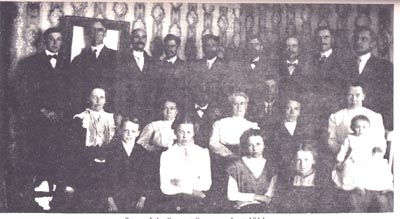His Writings
The First Thousand Years
This was one of a series of articles, or "books" as Frank Sandford liked to call them, which were written as they cruised around the world on Coronet. Written between 1907 and 1909, it is one of only a few of those books that have survived the ravages of time. On the cover page of our copy of The First Thousand Years is written in free hand, "This book was written by OS (or Our Shepherd, referring to Mr. Sandford) with the help of 'the 30' around 1907+". "The Thirty" were the crew members on board, each person being selected especially for the "journey 'round". As time passed the thirty acquired a special notoriety and perceived level of spirituality within The Kingdom.
 |
The "Thirty", taken around 1914 from The Sublimity of Faith by Frank S. Murray |
Mr. Sandford insisted on a peculiar procedure for writing the book. While he dictated the words to a stenographer in his room below deck, the rest of the crew or as many as could be spared sat nearby in the saloon to provide support. The book is 120 pages long and covers the period from creation to Enoch. Obviously, much of that time period is skipped over since Mr. Sandford picked out only those events and people that caught his interest and expanded on them. The following are excerpts which interested us.
Our special thanks to alert reader, Sylvia Springer, for the copy of this book.
"Save us, however, from so magnifying these points (the jots and tittles of Scripture) through the conceit of human wisdom as to stumble over the great truths from which they themselves emanate, taking with us into the ditch all those who follow us." (p 7) If only Mr. Sandford had followed that wisdom himself.
"His (God's) single word uttered to the man of God in response to the supplication - the word "edge" - shows us at least that we are not far away from the most ancient spot (Eden) as regards history, and the most sacred spot as regards the things of God upon the face of the entire globe - even the place of His Presence from creation. (p 53)
Mr. Sandford thinks God has told him he has figured out the approximate location of Eden, i.e. the edge of it. Why would not God show him the actual location?"People are usually deceived because there is something in their heart that loves a lie rather than the naked, rugged truth. People who love good appearances, facts covered up, an outside righteousness rather than an inside one; the praise of men rather than the praise of God who knows what they really are behind the scenes;" (p 67)
"He (Adam) was weak in that he was overcome by his wife’s influence."
"Adam knew better. He was not deceived, for the spirit of deception was not in his heart. He was influenced and led, but he did not have it in him to lead others astray; or to influence them to do what was wrong. She did."
"I have no doubt that Adam repented in dust and ashes for his sin in following his wife, and that he was cleansed and forgiven through the Gospel of Eden, that we shall see the first man in future ages - there through the grace of the Second Man." (p 68) Did Mr. Sandford think Eve did not repent and was not forgiven?"There is no wrong you can ever do a human being, or an animal, or a bird, or a fish, or even the plants of the field, but what the blood of the same will cry against you unto the righteous God." (p 74) Plants? What about all the birds he killed while cruising around the world?
"Undoubtedly she (Eve) showed her leading ability (which in her vanity she considered superior to that of Adam) in a seventh way - that is, in the training of her first-born. It was she that shaped, and formed his young life to vanity, and self-indulgence. There is not the slightest doubt of that in the mind of the author. She had made a terrible mistake in Eden. She continued her record outside the Garden." (p 92) Did Adam bear any responsibility in all this?
"The religion of living partly right and partly wrong, of pleasing yourself much of the time and hoping in the mercy of God the rest of the time, the aimless, indifferent, partly blind, inexact, slovenly (I might say) religion, which usually characterizes men, now made way for a life as exact and pleasing as that possessed by the prophet Abel." (p 94) The Sandford perspective of grace vs. legalism.